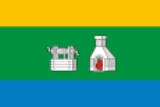
Yekaterinburg
Overview
Russia
Russia or , officially known as both Russia and the Russian Federation , is a country in northern Eurasia. It is a federal semi-presidential republic, comprising 83 federal subjects...
, the administrative center of Sverdlovsk Oblast
Sverdlovsk Oblast
Sverdlovsk Oblast is a federal subject of Russia located in the Urals Federal District. Its administrative center is the city of Yekaterinburg formerly known as Sverdlovsk. Population: -Geography:...
. Situated on the eastern side of the Ural mountain range
Ural Mountains
The Ural Mountains , or simply the Urals, are a mountain range that runs approximately from north to south through western Russia, from the coast of the Arctic Ocean to the Ural River and northwestern Kazakhstan. Their eastern side is usually considered the natural boundary between Europe and Asia...
, it is the main industrial
Industry
Industry refers to the production of an economic good or service within an economy.-Industrial sectors:There are four key industrial economic sectors: the primary sector, largely raw material extraction industries such as mining and farming; the secondary sector, involving refining, construction,...
and cultural
Culture
Culture is a term that has many different inter-related meanings. For example, in 1952, Alfred Kroeber and Clyde Kluckhohn compiled a list of 164 definitions of "culture" in Culture: A Critical Review of Concepts and Definitions...
center of the Urals Federal District
Urals Federal District
Ural Federal District is one of the eight federal districts of Russia. The district was established on 13 May 2000 by a decree of the President of Russia. The district is mostly located in the geographical region of Ural, but also includes some parts of the Volga Region; its extent is different...
with a population of 1,350,136 (2010 Census preliminary results) (up from 1,293,537 recorded in the 2002 Census
Russian Census (2002)
Russian Census of 2002 was the first census of the Russian Federation carried out on October 9 through October 16, 2002. It was carried out by the Russian Federal Service of State Statistics .-Resident population:...
), making it Russia's fourth-largest city. Between 1924 and 1991, the city was known as
Geographical renaming
Geographical renaming is the changing of the name of a geographical feature or area. This can range from the uncontroversial change of a street name to a highly disputed change to the name of a country. Some names are changed locally but the new names are not recognised by other countries,...
Sverdlovsk ; after the Bolshevik
Bolshevik
The Bolsheviks, originally also Bolshevists , derived from bol'shinstvo, "majority") were a faction of the Marxist Russian Social Democratic Labour Party which split apart from the Menshevik faction at the Second Party Congress in 1903....
party leader Yakov Sverdlov
Yakov Sverdlov
Yakov Mikhaylovich Sverdlov ; known under pseudonyms "Andrei", "Mikhalych", "Max", "Smirnov", "Permyakov" — 16 March 1919) was a Bolshevik party leader and an official of the Russian Soviet Republic.-Early life:...
.
The city was founded in 1723 by Vasily Tatischev and Georg Wilhelm de Gennin
Georg Wilhelm de Gennin
Georg Wilhelm de Gennin or Vilim Ivanovich de Gennin was a German-born Russian military officer and engineer who specialized in mining and metallurgy....
and named after Tsar
Tsar
Tsar is a title used to designate certain European Slavic monarchs or supreme rulers. As a system of government in the Tsardom of Russia and Russian Empire, it is known as Tsarist autocracy, or Tsarism...
Peter the Great's wife Empress Catherine I
Catherine I of Russia
Catherine I , the second wife of Peter the Great, reigned as Empress of Russia from 1725 until her death.-Life as a peasant woman:The life of Catherine I was said by Voltaire to be nearly as extraordinary as that of Peter the Great himself. There are no documents that confirm her origins. Born on...
(Yekaterina).

